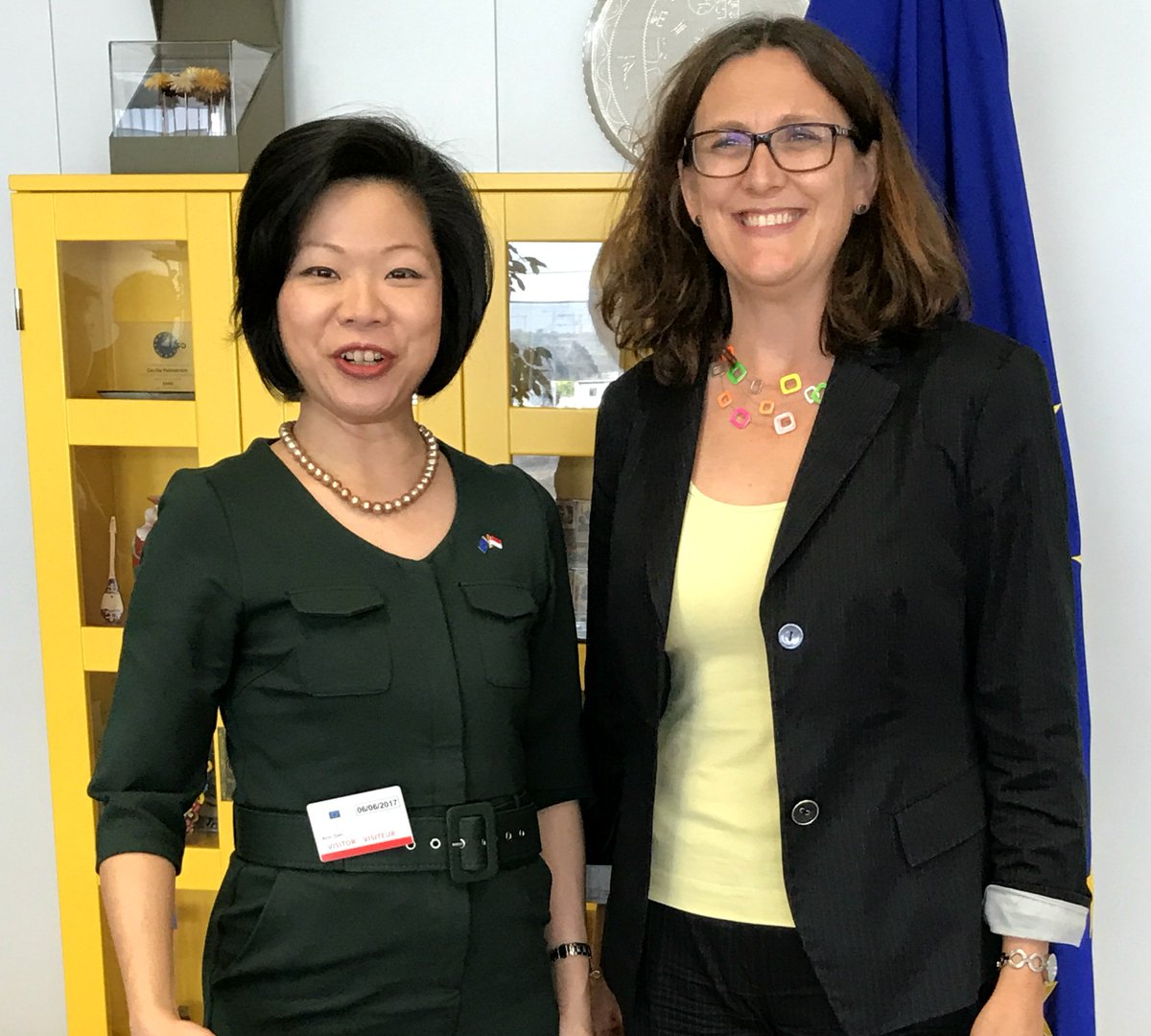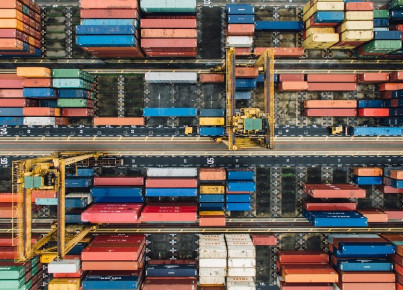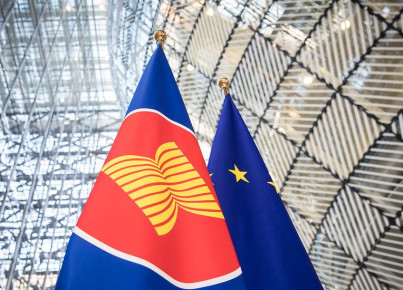The European Commission, on the 18th of April, presented the outcome of negotiations for the Economic Partnership Agreement with Japan and the trade and investment agreements with Singapore to the Council. This is the first step towards the signature and conclusion of these agreements.
Commissioner for Trade Cecilia Malmström said: “With Japan and Singapore we are making a strong statement in defence of open and fair trade based on rules. These win-win agreements will also create major opportunities for European businesses and citizens. The economic partnership with Japan will cover an area with 600 million consumers and a third of global GDP. Its economic potential is clearly unprecedented. Singapore is already a gateway for Europe into South East Asia, and with our new agreements we aim for a strong boost to our trade with the region. Both Japan and Singapore are important partners for us in defending multilateralism and ensuring strong international organisations.”
The trade and investment agreements with Singapore are the EU’s first completed bilateral deals with a member of the Association of Southeast Asian Nations (ASEAN). Within ASEAN, Singapore is by far the EU’s largest partner with a total bilateral trade in goods of €53.3 billion (2017) and in services of €44.4
billion (2016). Over 10,000 EU companies are established in Singapore and use it as a hub to serve the whole Pacific region. With these agreements, the EU has therefore made an important stride towards setting high standards and rules for the important and fast-growing Southeast Asian region. The deals also represent the first building block of a future region-to-region trade and investment agreement between the EU and ASEAN. Singapore is already the number one location for European investment in Asia, with investment between the two growing rapidly in recent years. Bilateral investment stocks reached €256 billion in 2016.
As well as offering huge economic opportunities, the trade agreements also include comprehensive chapters on trade and sustainable development; setting the highest standards of labour, safety, environmental and consumer protection; as well as strengthening joint actions on sustainable development and climate change and fully safeguarding public services.
The EU-Singapore trade agreement
The EU-Singapore trade agreement is one of the first ‘new generation’ bilateral agreements. On top of the classical removal of customs duties and non-tariff barriers for trade in goods and services, it contains important provisions on intellectual property protection, investment liberalisation, public procurement, competition and sustainable development.
The agreement establishes the conditions for EU businesses to take full advantage of the opportunities created in Singapore as the business and transport hub of Southeast Asia.
The agreement:
(1) Eliminates customs duties
Singapore will remove all remaining tariffs on certain EU products (like alcoholic beverages, including beer and stout) and will commit to keep unchanged the current duty-free access for all other EU products.
On the day the trade agreement enters into force, over 80% of all imports from Singapore will enter the EU duty-free. For the rest, EU tariffs will be removed within three or five years, depending on the product category. Sectors that will benefit from the immediate removal of tariffs are electronics, pharmaceuticals, petrochemicals, and processed agricultural products. Tariffs on certain types of textiles and carpets will be dismantled over three years; tariffs on bikes, fruits, cereals, and sports footwear will be removed over five years.
(2) Facilitates regional and global value chains
In today’s global economy, both large and small companies often operate along global value chains and their products generally contain domestically produced components as well as inputs sourced from abroad.
The rules of origin agreed in the trade agreement seek to strike a prudent balance between leaving companies some degree of flexibility to source parts from other countries, and establishing sufficient clarity on the minimum conditions to be met for products to qualify as European or Singaporean and benefit from preferences under the agreement.
The EU-Singapore trade agreement recognises the integrated nature of supply chains in Southeast Asia. It includes the concept of ‘ASEAN cumulation’ to allow Singapore-based manufacturers to include components sourced from other ASEAN Member States as originating content when determining whether a specific product can meet the rules of origin requirements.
The agreement foresees further facilitating regional cumulation in a wider range of products once the EU has concluded additional trade agreements with other ASEAN Member States.
(3) Removes technical and non-tariff barriers to trade in goods
Without compromising on health, safety and the environment, the agreement addresses regulatory divergences in some key sectors that constitute non-tariff barriers to EU-Singapore trade:
- Electronics
The EU and Singapore agree to base their standards, technical regulations and conformity assessment procedures on relevant international standards.
This will avoid duplicative and unnecessarily burdensome conformity testing procedures with respect to product safety and electromagnetic compatibility. The idea is that a product that is considered to be safe to market in the EU should also be considered to be safe in Singapore.
The agreement will also eliminate mandatory third party conformity assessments for product safety schemes for certain categories of electronic products and prioritise other forms of conformity assessment, such as the supplier’s declaration of conformity and post-market surveillance mechanisms that are the norm in the EU.
- Motor vehicles and vehicle parts
The EU and Singapore agree to promote international standards for cars and car parts and to refrain from introducing measures which deviate from international standards.
The agreement also provides for new motor vehicles and car parts from the EU to be accepted by Singapore without any additional testing or certification requirements, provided that the products are certified in accordance with international standards accepted in the EU, notably United Nations Economic Commission for Europe (UNECE) -type approval regulations.
- Pharmaceuticals and medical devices
The EU and Singapore agree to use international standards, practices and guidelines for pharmaceutical products and medical devices, particularly those developed by international standard setting bodies. The agreement encourages transparent and non-discriminatory procedures for listing, pricing and reimbursement of pharmaceuticals. This is important for both partners.
- Equipment for renewable energy generation
The EU and Singapore agree to use international or regional standards, where these exist, for products used to generate energy from renewable and sustainable non-fossil sources. Singapore will accept EU declarations of conformity or test reports and the EU will accept Singaporean suppliers’ declarations of conformity under the same terms as from EU suppliers.
- Raw and processed products of animal and plant origin
Most jurisdictions in the world – including the EU and Singapore – have in place stringent laws and procedures for agricultural and food-related products known as sanitary and phytosanitary measures. These will not be changed by the agreement. While maintaining strong safety requirements, the trade agreement aims to facilitate EU-Singapore trade in food products. For instance, Singapore will evaluate the performance of the EU’s inspection and certification systems for meat producing establishments rather than requiring its own authorities to inspect each individual abattoir or food processing plant individually before it can export.
(4) Facilitates trade through enhanced customs cooperation
The EU and Singapore will enhance customs cooperation to simplify, harmonise, standardise, and modernise trade procedures so as to cut transaction costs for business. Both sides will be vigilant about the safety and security of legitimate trade. The agreement will bolster supply chain security through strengthened cooperation, including steps towards the mutual recognition of trade partnership programmes (such as the EU ‘Authorised Economic Operators’ programme).
(5) Opens up services and investment markets in a comprehensive way
The trade agreement aims to make the business environment more predictable and create further opportunities for EU and Singapore businesses and more choice for consumers.
It provides extra market access for a wide range of services. Thanks to this agreement, Singapore will make it easier for EU companies working in the fields of telecommunications, environmental services, engineering, computing and maritime transport. In financial services, European commercial banks will, under specific conditions, be able to increase the number of customer services locations. In certain sectors domestic and foreign services providers will be treated alike in terms of rules and regulations, creating predictability and a level playing field.
The EU and Singapore retain the right to establish quality and safety standards and to regulate and introduce new regulations to pursue legitimate policy objectives such as security, public health and safety. The agreement protects certain sensitive sectors (like TV, radio and film, public health and education, social services and water distribution) in which no commitments are made.
The trade agreement will present new opportunities for firms wanting to establish a commercial presence, by improving market access in services and many non-services sectors such as manufacturing. This means new opportunities to attract investment for instance for industrial production.
(6) Brings new tendering opportunities for EU bidders
As members of the WTO Agreement on Government Procurement, Singapore and the EU have already taken substantive commitments when it comes to open public tendering, have modern procurement regimes and apply high standards of transparency and procedural fairness to their public tendering. In many cases foreign firms are already able to compete for public contracts above a certain value. In the agreement, both sides agree to improve and simplify the tendering process and have committed to expand the number public contracts available for bidding, notably in the railways sector and for the Singaporean National Environment Agency.
(7) Protects intellectual property rights
Both the EU and Singapore already have modern systems to protect and enforce intellectual property rights. The trade agreement consolidates this and sets out basic rules on enforcement (other than criminal enforcement), including at the border.
Intellectual property right-holders will be able to get help from customs authorities to detain counterfeit trademarked or GI-protected goods, pirated copyrighted content and registered designs.
On copyright, the agreement provides for equitable payment for both performers and producers of recorded music played on the radio, TV or in places open to the public (such as shops, restaurants, bars)– which will improve the current situation in Singapore.
Singapore has agreed to strengthen its existing geographical indications (GI) regime by setting up a system to register GIs in Singapore. Once registered in Singapore, around 190 GIs for wines, spirits and certain agricultural products will enjoy levels of protection equal to those in the EU thanks to this agreement. This includes Bordeaux wines, Parma ham, Champagne and Bayerisches Bier. Better protection for such products will also improve Singapore consumers’ awareness of authentic top-quality EU GI products.
(8) Includes binding commitments on trade and sustainable development
The EU’s aim is to ensure its trade policy supports sustainable development within the EU, in its partner countries and globally. The agreement includes a robust, comprehensive and binding chapter to ensure trade supports environmental protection and social development.
The agreement has binding commitments to ensure that domestic levels of environmental and labour protection are in line with core international standards and agreements. The EU and Singapore also agree to prevent “race-to-the-bottom” practices as regards labour and environmental laws to attract trade or investment.
The agreement aims to enhance the contribution of trade and investment to sustainable development, including issues related to corporate social responsibility, sustainability assurance schemes (eco-labelling initiatives, and fair and ethical trade), and the conservation and sustainable management of natural resources.
The agreement sets out how social partners and civil society will be involved in implementing and monitoring it. This includes making use of new or existing consultative mechanisms to engage stakeholders. It foresees a mechanism to settle any disagreements on the chapter’s implementation.
The EU-Singapore investment protection agreement
The Investment Protection Agreement will ensure a high level of investment protection, while safeguarding the EU’s and Singapore’s rights to regulate and pursue public policy objectives such as the protection of public health, safety and the environment.
The agreement contains all aspects of the EU’s new approach to investment protection and its enforcement mechanisms that are not present in the existing bilateral investment treaties between Singapore and EU Member States. The agreement replaces the 12 existing bilateral investment treaties and establishes a modern common investment protection framework for all EU investors in Singapore.
Under the agreement, the EU ensures that its investors and their investments in Singapore will be granted fair and equitable treatment and not be discriminated against compared to Singaporean investments in comparable situations. At the same time, the agreement protects EU investors and their investments in Singapore from expropriation, unless it is for public purposes, in accordance with due process, on a non-discriminatory basis and against payment of prompt, adequate, and effective compensation according to fair market value of the expropriated investment.
The agreement sets up a modern and reformed Investment Court System for resolving disputes similar to the one in the EU-Canada trade agreement. This system ensures that investment protection rules are adhered to and seeks to strike a balance between protecting investors in a transparent manner and safeguarding the right of a State to regulate in order to pursue public policy objectives. The agreement sets up a standing international and fully independent dispute resolution system. The cornerstones of the new system are:
- A permanent Investment Tribunal of First Instance and an Appellate Tribunal that will ensure legal correctness and certainty about the interpretation of the agreement;
- All members of the Tribunals will be appointed by the EU and Singapore in advance and be subject to strict rules of independence, integrity, and ethical behaviour. All Tribunal members shall comply with a binding code of conduct included in the agreement;
- The EU and Singapore will only appoint Tribunal members who have demonstrated expertise in public international law and possess the qualifications required in their respective countries for appointment to judicial offices or be jurists of recognised competence;
- Proceedings before the Tribunals will be fully transparent. All documents will be made publically available and all hearings will be open to the public. Interested third parties will be allowed to make submissions in proceedings before the Tribunal;
- Prohibition of parallel or multiple proceedings; and
- Provisions against abuses of the system – for example, rules to prevent fraudulent or manipulative claims such as the re-structuring of a business for the purpose of submitting a claim.
Next steps
Once approved by the Council, the agreements will be sent to the European Parliament, aiming for the entry into force of the trade agreements with Japan and Singapore before the end of the current mandate of the European Commission in 2019; the investment protection agreement with Singapore will follow its ratification procedure also at Member State level.






